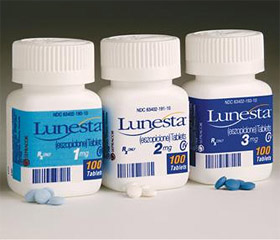 |
 |
 |
 Health & Beauty | April 2006 Health & Beauty | April 2006  
Consumer Group Awards 'Bitter Pills' to Drugmakers
 Toni Clarke - Reuters Toni Clarke - Reuters


| | A national health and consumer advocacy group on Wednesday singled out ads by Sepracor and four other drugmakers as evidence of overly aggressive direct marketing by pharmaceutical companies to consumers. (Reuters) |
It's one of the most recognizable logos in drug advertising: a light green luna moth that floats across the television screen during advertisements for Sepracor Inc.'s sleeping pill Lunesta.

A national health and consumer advocacy group on Wednesday singled out ads by Sepracor and four other drugmakers as evidence of overly aggressive direct marketing by pharmaceutical companies to consumers.

The Prescription Access Litigation Project (PAL) a coalition of 118 state, local and national consumer health advocacy groups, gave the five what it calls a "bitter pill" award.

The awards were created in 2005 to highlight the potential problems of excessive marketing, particularly direct-to-consumer advertising which skirts the input of doctors, the group said.

"Drug ads expand the market for newer drugs far beyond those patients that actually need them, interfere with the doctor-patient relationship, and perpetuate the myth that 'there's a pill for every ill' and that 'newer is better,'" it said in a statement.

The list also includes Pfizer Inc.'s cholesterol-lowering treatment Lipitor; Sanofi-Aventis' sleep drug Ambien; Eli Lilly and Co.'s Strattera for attention deficit hyperactivity disorder; and AstraZeneca Plc's cholesterol drug Crestor.

According to the trade publication Medical Marketing and Media, Sepracor spent $215.1 million on Lunesta advertising in 2005, second only to the amount AstraZeneca spent on its "purple pill" Nexium. Pfizer's spending on Lipitor, the world's biggest-selling drug, was a mere $93.4 million by comparison.

While a company like Pfizer, the world's biggest drug maker, is expected to spend big on consumer advertising, a company like Sepracor, which has a market capitalization of just $4.6 billion to Pfizer's $182 billion, isn't, said Alex Sugerman-Brozan, director of PAL.

"It's very unusual," he said. "Sepracor has shot up the chart in spending. We'll see in 2006 whether they've overextended themselves."

A spokesman for Sepracor was not immediately available for comment.

PAL also gave an award to The Pharmaceutical Research and Manufacturers of America (PhRMA), which represents the pharmaceuticals industry, for not enforcing the direct-to-consumer advertising guidelines it issued last year.

PhRMA said in a statement that the guidelines "are beginning to work, and we believe they should be given additional time to function more robustly." | 
 | |
 |



